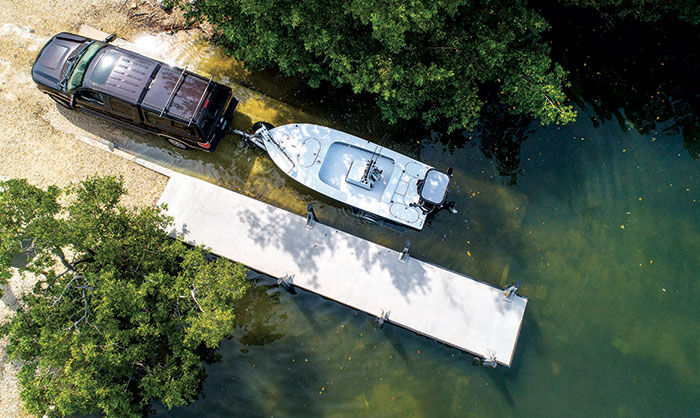Advertisement
The Sport Fish Restoration and Boating Trust Fund returns tax money for boating infrastructure improvements that benefit boaters and anglers. BoatUS is working to ensure it continues.

Money from the Sport Fish Restoration and Boating Trust Fund has constructed or improved more than 11,000 boating access sites. (Photo: Jason Stemple)
Nobody likes taxes and fees, partly because it often feels like your money is going to things you don't know or care about. Wouldn't it be nice if you knew your money was going to something you really wanted, like say, boating and fishing improvements? Good news! When you buy certain marine gear and gasoline, you'll be happy to learn that a portion of the taxes on these products go into the Sport Fish Restoration and Boating Trust Fund, and get spent on real improvements for boaters and anglers. How much? How does $1.10 billion a year sound? That's the amount that the fund, combined with state fees and licenses, generates every year. Here's how the estimated 50 million American anglers and 88 million boaters benefit from the Trust Fund.
Follow The Money
When you buy most fishing gear and tackle, imported boats, or gasoline, taxes on those products go into the Sport Fish Restoration and Boating Trust Fund — not the general fund. The next time you feel the pain of a fill up, keep in mind that more than 60% of Trust Fund money comes from the gas excise tax. All those funds go toward building boat ramps and updating municipal marinas, managing hatcheries and stocking fish, wetlands restoration and habitat improvements, and funding aquatic education to teach kids about the outdoors.
Some of the money also goes to the U.S. Coast Guard Boating Safety Division for recreational boating safety and grant programs and is also distributed to state boating agencies for safety education, search and rescue, and law enforcement.
Most Trust Fund money is leveraged for an even greater benefit with additional state and local matching funds (see "BIG Money" below). In fact, the Trust Fund requires states to contribute 100% of the fees you pay for fishing licenses to help fund state fish and wildlife agencies. What all this means for you is better access to the water, safer boats and equipment with fewer accidents and injuries, more pumpout stations for cleaner water, and fish-conservation programs to improve fishing. And all these benefits come from taxes that could've been steered to non-boating activities, but the Trust Fund puts the money back into boating.
BIG Money
One of the mechanisms that brings money directly to boaters is called BIG — Boating Infrastructure Grants. The BIG program is used to construct, renovate, and maintain facilities for transient boaters who use boats at least 26 feet long.
As an example, Beaufort, South Carolina, recently completed two projects using money from the BIG program. One was to install a mooring field; the other was for refurbishing deteriorated transient docks. The state has also used BIG money to improve access to the water from Hilton Head to Myrtle Beach.
In California, the Port San Luis Harbor District used BIG money to add solar-lighted channel markers. Other BIG money was used for adding 76 transient slips in Friday Harbor, Washington; 42 new dock and slips in Rockport, Texas; and rebuilding aged docks in Los Angeles. For 2019, more than $20 million dollars will be awarded for grants.
BoatUS championed the creation of this program and participates in the review of grant applications today.
"The Trust Fund is a true user-pay, user-benefit program that saves lives, keeps our fish stocks healthy, and makes boating accessibility a priority," says David Kennedy, our BoatUS Government Affairs manager.
How It Helps You
The Sport Fish Restoration and Boating Trust Fund creates real opportunities for boaters and anglers. Over an eight-year period (through 2015), the fund:
- Stocked 3.8 billion fish.
- Operated and maintained nearly 5,000 public fishing areas and facilities.
- Acquired or leased 63,337 acres of fish habitat.
- Improved and managed 63,549 acres of coastal wetlands.
- Restored 6,484 acres of coastal wetland habitat.
For boaters, the fund also:
- Constructed more than 3,800 boating access sites.
- Renovated or improved more than 7,400 boating access sites.
- Operated and maintained more than 3,000 boating access sites.
- Constructed 1,171 tie-up facilities for transient boats.
- Constructed more than 3,800 coastal boat and 2,200 inland boat sewage pumpout facilities.
Advertisement
Education is another component of the fund, which included:
- Teaching 4.7 million students in aquatic resource education,
- Providing fishery habitat management assistance to 70,000 landowners, and
- Conducting life history and population surveys on sportfish nationwide.
Here's how the fund makes boating safer:
- 1,640,829 hours on-water enforcement by states
- 1,569,103 compliance checks by state law enforcement
A Legacy Of Trust
The Sport Fish Restoration and Boating Trust Fund began nearly 70 years ago as the Sport Fish Restoration Act and has been refined and expanded by Congress over the years. Every few years, Congress has to reauthorize the transfer of the boating portion of the federal gasoline excise taxes collected for the fund by reauthorizing a nationwide transportation bill, called the Surface Transportation Act.
"Some in Washington have viewed these boater and angler tax dollars as a way to solve their own budget problems," Kennedy says. "Every time the Trust Fund is up for renewal, we work very hard to make certain the re-authorization is continued so that the money boaters and anglers pay stays intact for the intended use: saving lives, keeping our fish stocks healthy, and making it easier to enjoy the water."
BoatUS, as a longtime champion of the Trust Fund, along with other members of the Angling and Boating Alliance, has worked to ensure it continues to be used for key boating and fishing programs.
"In 2020, the bill is again up for renewal," says Kennedy. "We continue to work with our partners to ensure this money comes back to boaters and anglers."
